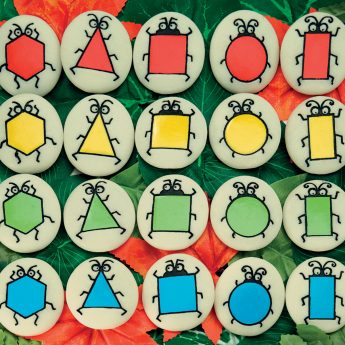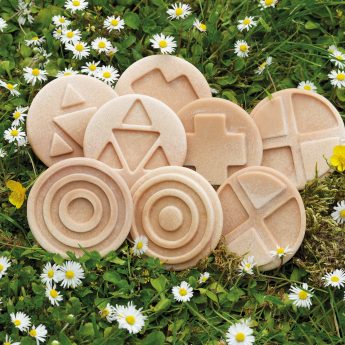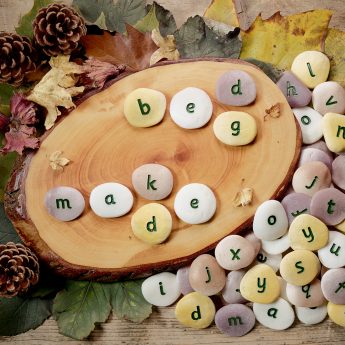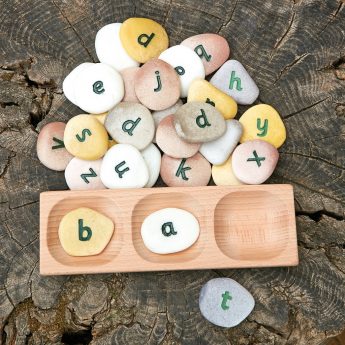M is for Montessori – recommended resources
A Montessori nursery follows the philosophies and teachings of Dr. Maria Montessori. It is designed to take advantage of the sensitive years between the ages of three and five, when the child is most able to absorb information from his environment.

Here, Louise Norwood, Head of The Oval Montessori Nursery in London, gives her verdict on 7 resources that link well with the Montessori Method.
- Sorting Stones
Montessori sets great store in ‘sorting’ within the Sensory materials. By sorting, children understand that things are alike and different as well as that they can belong and be organised into certain groups. Getting practice with sorting at an early age is important for numerical concepts and grouping numbers and sets when they’re older. This type of thinking starts them on the path of applying logical thinking to objects, mathematical concepts and every day life in general. This lovely tactile set of stones leaves the child to choose whether to sort the insects by shape or colour.
- Interlocking Sensory Stones
These stones provide an excellent opportunity for the child to learn through stereognostic sense (judging shape and size through touch alone), and the visual sense (detecting similarities and differences using the eyes which also develops muscular sense). Complements the Montessori Sensorial materials perfectly.

- Alphabet Pebbles (wordbuilding set) and 3-Pebble Wordbuilding Tray
The alphabet pebbles provide children with an outstanding sensorial experience. Children can hold the pebbles in their hands, trace the letter shape and manipulate them while constructing words. These can be used as an alternative to the small movable alphabet and in conjunction with Montessori picture cards. There are many extensions to this work including making up their own words and then writing them out.

- Rhyming Pebbles
These make a lovely addition to the language shelves. Having the set in two colours provides a control of error/self corrector. Can be used in conjunction with the Small Movable Alphabet or Alphabet Pebbles as the child spells out the words and/or makes new rhyming words.

- Ragtag Rhymes Reading Books
A delightful set of reading books that have had the children so engaged – each character has its own personality with which the child can empathise. A really fun set of books and with wonderful illustrations. Goodbye to the cat sat on the mat!
- Match and Measure Dinosaur Bones and Activity Cards
Teaching young children how to match, classify, sort and measure is an important part of developing an understanding of early maths because these skills help children identify and describe relationships between items. The Dinosaur Bones and Cards are perfect for this. The activities you can do with the bones are limitless as you can use them to teach all the above in an infinite number of ways.

- Feels-Write Number Stones and Tactile Counting Stones
The Feels-Write Number Stones are exactly what they say! They are wonderfully tactile and the child can trace the number in the stone, therefore committing it to muscular memory. These can be used in conjunction with the Tactile Counting Stones to make a ‘matching the symbol to the fixed quantity exercise’.

More about Montessori
Although there are many high-quality nurseries where creative daily programmes are followed, most do not follow a single philosophy of child development as does The Oval Montessori Nursery. The Montessori method is a complete integrated approach to childhood education and child care based on a single individual’s life work. Dr. Montessori’s incredible insight and her scientific observations of children’s development have proven accurate many times over, all around the world.
The ‘secret’ lies in the way the children are respected and the way their inner needs are met through a carefully prepared environment. The class is child-centred and not adult centred; however the adult / teacher plays a very important role in both preparing the classroom and guiding the children within that environment.
A Montessori nursery is often quieter and calmer than a traditional nursery environment and we often get comments from visitors that the children are very well behaved! They ask us if we ever have discipline problems. Discipline usually comes from the child as self-discipline (or self-regulation), which is learned in the Montessori environment through the use of the wonderful activities available every day. Re-direction to purposeful activity that meets a need of that child and inspires them to intense concentration, virtually eliminating the need for outward discipline.
Our Montessori nursery is full of happy children who are doing the activities that they want to do – activities that have been observed for more than 100 years as the things that all children like to do. Activities that help children grow, mature and become active participants in life.
See all of Yellow Door’s Montessori-inspired resources here

 Register/Log in
Register/Log in
 Basket
Basket




